人教版九年级英语 Unit 10 You're supposed to shake hands Section B Writing 课件(共25张PPT)
文档属性
| 名称 | 人教版九年级英语 Unit 10 You're supposed to shake hands Section B Writing 课件(共25张PPT) | 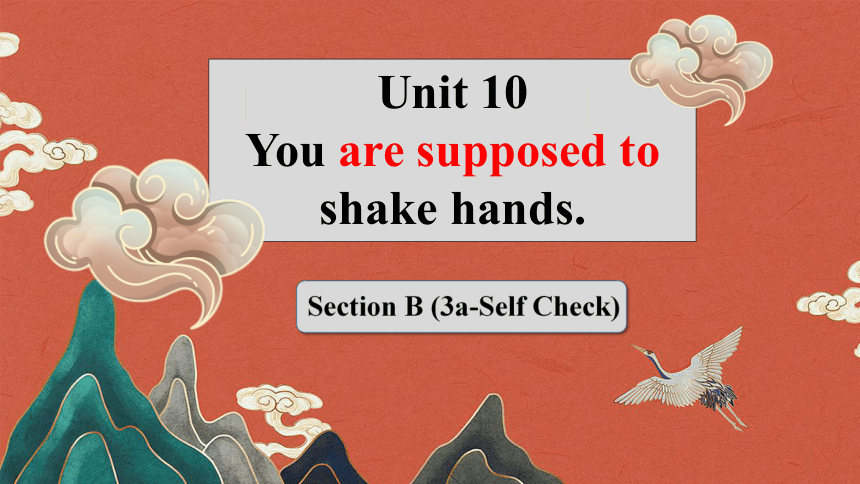 | |
| 格式 | pptx | ||
| 文件大小 | 58.1MB | ||
| 资源类型 | 教案 | ||
| 版本资源 | 人教新目标(Go for it)版 | ||
| 科目 | 英语 | ||
| 更新时间 | 2023-09-24 11:31:36 | ||
图片预览

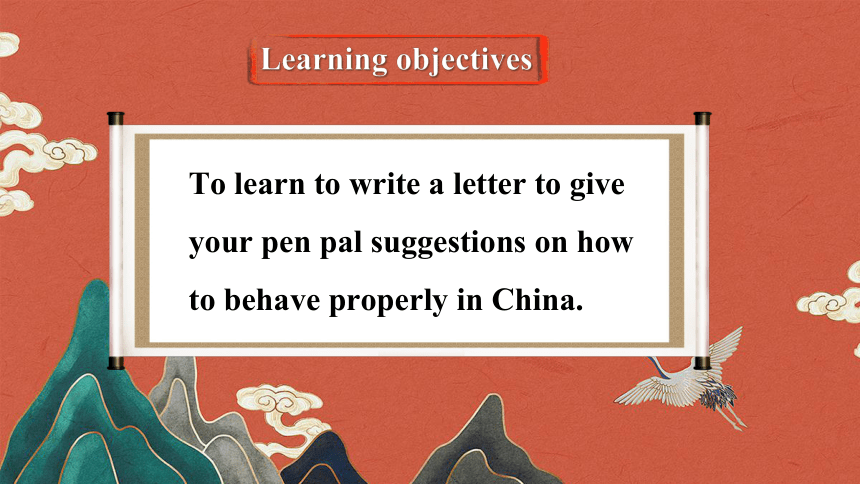
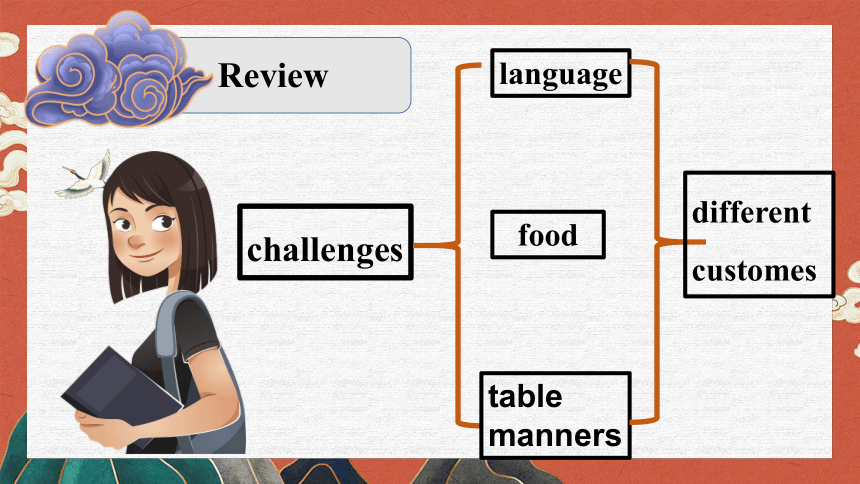
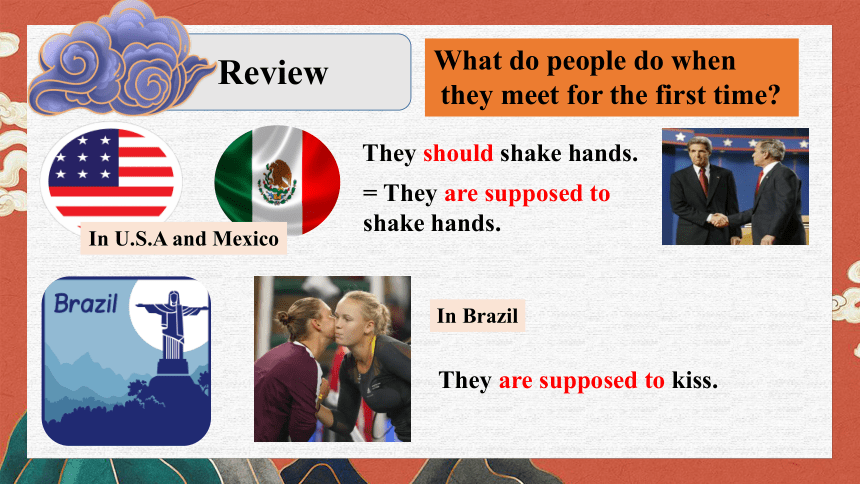

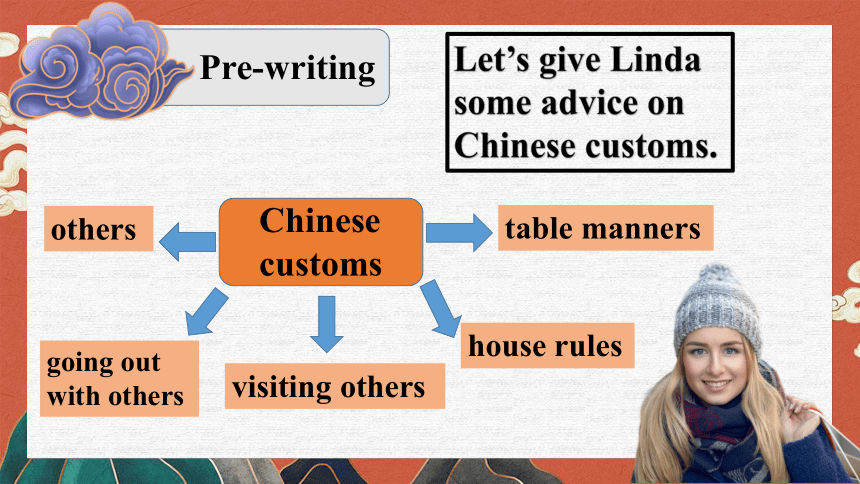
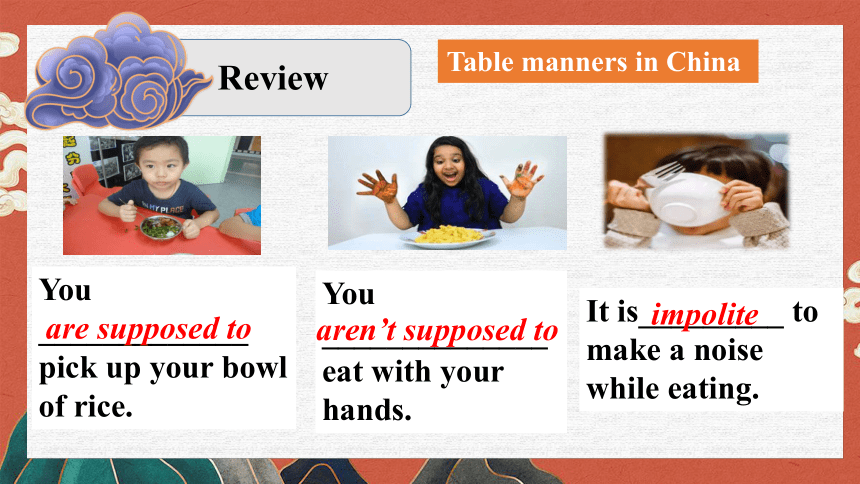
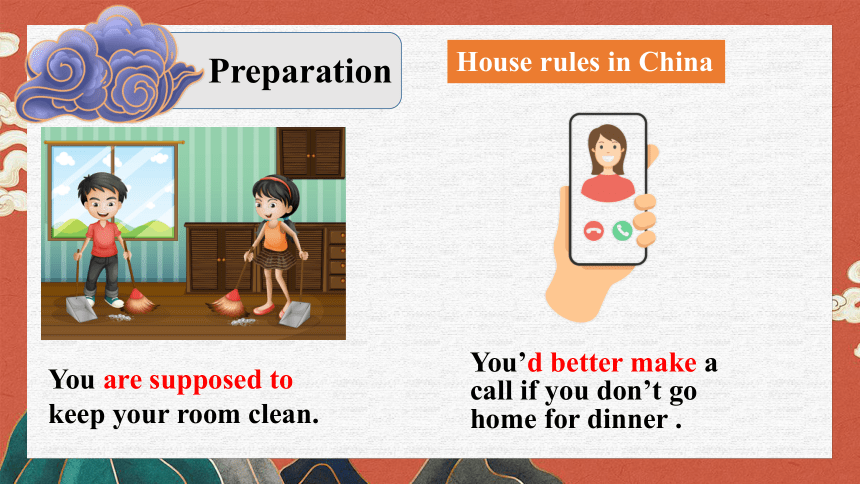
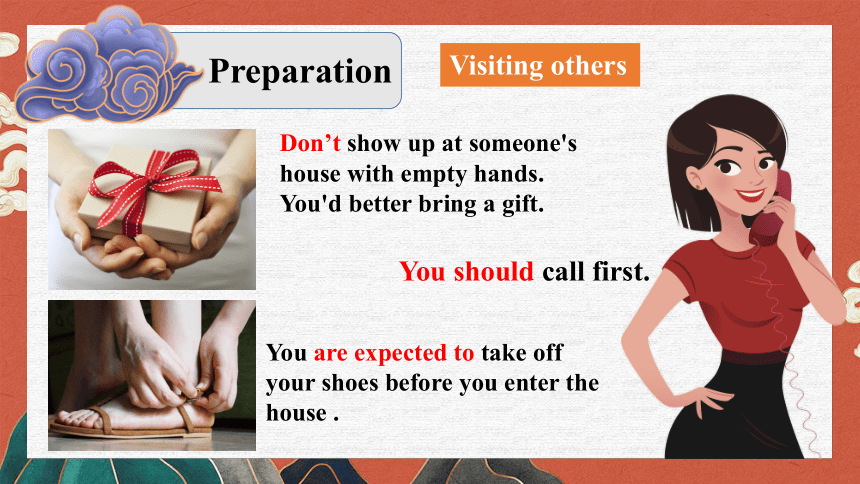
文档简介
(共25张PPT)
Unit 10
You are supposed to shake hands.
Section B (3a-Self Check)
Learning objectives
To learn to write a letter to give your pen pal suggestions on how to behave properly in China.
challenges
Review
language
food
table manners
different
customes
Review
They are supposed to kiss.
In Brazil
What do people do when
they meet for the first time
They should shake hands.
= They are supposed to shake hands.
In U.S.A and Mexico
Pre-writing
My pen pal Linda, from Brazil, is coming to China and she’ll stay at my home for several weeks . She is a little nervous because she doesn’t know much about Chinese customs.
I want to know more about Chinese customs. I love chinese culture.
Pre-writing
Let’s give Linda some advice on Chinese customs.
Chinese customs
table manners
house rules
visiting others
going out with others
others
Review
You _____________ pick up your bowl of rice.
are supposed to
You ______________
eat with your hands.
aren’t supposed to
It is_________ to make a noise while eating.
Table manners in China
impolite
Preparation
You’d better make a
call if you don’t go
home for dinner .
You are supposed to keep your room clean.
House rules in China
Preparation
Visiting others
You should call first.
Don’t show up at someone's
house with empty hands.
You'd better bring a gift.
You are expected to take off your shoes before you enter the house .
Preparation
Going out with others
You should make a going-out plan with friends first.
You should tell the hostess where you are going, who you are going with and when you will come back.
Your pen pal is coming to China on an exchange program. He / She is asking you about Chinese customs and what he/she is supposed to do or not. Make notes in the chart.
Table manners It’s polite/impolite to …
House rules You’re supposed/not supposed to …
Going out with people You should …
3a
Table manners
You are not supposed to start eating first if there are older people at the table.
It’s impolite to stick your chopsticks into your food.
You shouldn’t point at anyone with your chopsticks.
It’s impolite to knock your empty bowl with your chopsticks.
House rules
Going out with people
You’re supposed to shake hands with people.
You’re supposed to say “Nihao” to people.
You’re not supposed to kiss or hug with people.
You should make a going-out plan with friends.
It's important to arrive at the meeting place on time.
You should tell the host where you are going and who you are going with.
Pre-writing
Thanks for your advice. Could you write a letter to me
Write a letter to Linda to give her advice and suggestions on how to behave properly in China.
Write a letter to your pen pal to give him/her advice and suggestions on how to behave properly in China.
3b
Dear ______________,
You must be excited about coming to China soon. Let me give you some suggestions and advice about Chinese customs. When you’re eating at the table, it’s impolite to___________________________________________
____________________________________________________________
In our house, you’re supposed to__________________________________
When you go out with people, you should___________________________
____________________________________________________________
Have a safe trip, and I look forward to meeting you soon!
Best wishes,
______________
主题是中国风俗习惯,时态用一般现在时,以第二人称为主
用本单元目标语言:be supposed to, it’s impolite to, you should和所积累的信息,陈述中国的风俗习惯
信的结尾表达祝福和期待。
单元写作话题
本单元以“ 风俗习惯 ”为话题,具体到书面表达中,要求同学们会写有关customs, habits, manners 等方面的作文,要求我们重点掌握be supposed to do 这一结构。
体裁
体裁
时态
人称
书信体应用文。
要注意格式。
一般现在时。
第二人称。
Write a letter to your pen pal to give him/ her advice and suggestions on how to behave properly in China.
Dear________,
You must be excited about coming to China soon. Let me tell give you some suggestions and advice about Chinese customs.
Have a safe trip, and I look forward to meeting you soon!
Best wishes.
Table manners
House rules
Going out with people
_____, when you are eating at the table,____
_____________________________________
_____________________________________.
______, in our house, ___________________
_____________________________________
_____________________________________.
_______, when you go out with people, ____
_____________________________________
_____________________________________.
Form an outline
Beginning
Body
Ending
While-writing
Useful Expressions
1. You’re (not) supposed to …
2. It’s impolite to …
3. You aren’t expected to ...
4. In my culture, when you are free,
you can …
5. The most important thing you
should pay attention to is …
6. Different countries have
different manners.
7. You can/could/can’t/couldn’t ...
Linking words
Firstly, However,
First of all, What’s more,
Instead, In my opinion,
Besides, All in all,
In addition, Finally,
Furthermore, In a word,
As the saying goes, …
Dear Linda,
You must be excited about coming to China soon. Let me give you some suggestions and advice about Chinese customs.
When you’re eating at the table, It’s polite to ask older people to start eating first at the table. . You should let them start first. When you are eating with chopsticks, it is impolite to point at other people with your chopsticks. It is also impolite to stick your chopsticks into the bowl of rice and leave them there. In our house, you’re supposed to keep your room clean. You’re supposed to make a call if you don’t go home for dinner.
You’re not supposed to go to bed late at night.
When you go out with people, you should tell the hostess where you are going, who you are going with and when you will come back. In our culture, the hostess will worry a lot about the safety of her guest, so a polite guest will always let her know these things.
Have a safe trip, and I look forward to meeting you soon!
Best wishes,
Li Wei
Sample Writing
Tips:
①use a clear structure
②use details and linking words
③use different sentences
Let’s write!
假如你叫李娜,你的笔友 Tom 要来中国学习一段时间。他想了解一下中国的风俗习惯, 请你给他写封信,讲述一些中国的习俗,以及如何表现才得体。
内容提示:1. 可以从餐桌礼仪、家规、外出等方面介绍;2. 告诉他哪些是应该做的,哪些不应该做。
任务:
列出文章的大纲。
Outline
Beginning
Body
Ending
Dear ______________,
You must be excited about coming to China soon. Let me give you some suggestions about Chinese customs.
Table manners in China
Houses rules
Going out with people
Have a safe trip, and I look forward to meeting you soon!
Frame and content
(结构和内容)
clear frame
(结构清晰)
complete content
(内容完整)
Rich language
(语言)
good adjectives
(好的形容词)
good phrases
(好的词组)
use clauses
(使用从句)
use linking
words
(使用连接词)
Correct grammar
(语法)
correct tense
(时态)
spelling words
(单词拼写)
punctuations
(标点符号)
Good handwriting
(书写)
clean and neat
(干净整洁)
Check List
Peer-editing
Self-check
1. Fill in the blanks with the words in the box.
worth
capital
basic
traffic
empty
mad
knocking
1. In many countries, it is impolite to show up at someone’s house for the first time with ________ hands. You should always bring a small gift.
2. Billy was very uncomfortable at a fine-dining restaurant last night
because he didn’t know _____ table manners.
3. It is _________ spending the time to learn about the customs of a
country before you go there. That way, you will know what you
are supposed to do in different situations.
4. The ________ is always the worst in the _________ city. It’s
important to leave earlier if you are traveling by car.
5. Sandy went into her sister’s room without ________ on the door.
That made her sister _________.
empty
basic
worth
capital
traffic
knocking
mad
2 . Think about your culture and make statements.
In my culture, when you …
you’re supposed to ___________________________________
you’re not supposed to _____________________________________
you’re expected to __________________________________________
it’s impolite to _______________________________________
it’s important to _______________________________________
allow the elderly to start eating first.
stick your chopsticks into a bowl of rice.
keep your mouth closed when you are chewing.
reach across the table to pick certain foods.
ask for permission to leave the table early.
1. Review the new words and expressions in Unit 10.
2. Polish your writing according to your group members’ advice.
3. Finish the exercises in workbooks.
4. Preview the new words and expressions in Unit 11.
Homework
Unit 10
You are supposed to shake hands.
Section B (3a-Self Check)
Learning objectives
To learn to write a letter to give your pen pal suggestions on how to behave properly in China.
challenges
Review
language
food
table manners
different
customes
Review
They are supposed to kiss.
In Brazil
What do people do when
they meet for the first time
They should shake hands.
= They are supposed to shake hands.
In U.S.A and Mexico
Pre-writing
My pen pal Linda, from Brazil, is coming to China and she’ll stay at my home for several weeks . She is a little nervous because she doesn’t know much about Chinese customs.
I want to know more about Chinese customs. I love chinese culture.
Pre-writing
Let’s give Linda some advice on Chinese customs.
Chinese customs
table manners
house rules
visiting others
going out with others
others
Review
You _____________ pick up your bowl of rice.
are supposed to
You ______________
eat with your hands.
aren’t supposed to
It is_________ to make a noise while eating.
Table manners in China
impolite
Preparation
You’d better make a
call if you don’t go
home for dinner .
You are supposed to keep your room clean.
House rules in China
Preparation
Visiting others
You should call first.
Don’t show up at someone's
house with empty hands.
You'd better bring a gift.
You are expected to take off your shoes before you enter the house .
Preparation
Going out with others
You should make a going-out plan with friends first.
You should tell the hostess where you are going, who you are going with and when you will come back.
Your pen pal is coming to China on an exchange program. He / She is asking you about Chinese customs and what he/she is supposed to do or not. Make notes in the chart.
Table manners It’s polite/impolite to …
House rules You’re supposed/not supposed to …
Going out with people You should …
3a
Table manners
You are not supposed to start eating first if there are older people at the table.
It’s impolite to stick your chopsticks into your food.
You shouldn’t point at anyone with your chopsticks.
It’s impolite to knock your empty bowl with your chopsticks.
House rules
Going out with people
You’re supposed to shake hands with people.
You’re supposed to say “Nihao” to people.
You’re not supposed to kiss or hug with people.
You should make a going-out plan with friends.
It's important to arrive at the meeting place on time.
You should tell the host where you are going and who you are going with.
Pre-writing
Thanks for your advice. Could you write a letter to me
Write a letter to Linda to give her advice and suggestions on how to behave properly in China.
Write a letter to your pen pal to give him/her advice and suggestions on how to behave properly in China.
3b
Dear ______________,
You must be excited about coming to China soon. Let me give you some suggestions and advice about Chinese customs. When you’re eating at the table, it’s impolite to___________________________________________
____________________________________________________________
In our house, you’re supposed to__________________________________
When you go out with people, you should___________________________
____________________________________________________________
Have a safe trip, and I look forward to meeting you soon!
Best wishes,
______________
主题是中国风俗习惯,时态用一般现在时,以第二人称为主
用本单元目标语言:be supposed to, it’s impolite to, you should和所积累的信息,陈述中国的风俗习惯
信的结尾表达祝福和期待。
单元写作话题
本单元以“ 风俗习惯 ”为话题,具体到书面表达中,要求同学们会写有关customs, habits, manners 等方面的作文,要求我们重点掌握be supposed to do 这一结构。
体裁
体裁
时态
人称
书信体应用文。
要注意格式。
一般现在时。
第二人称。
Write a letter to your pen pal to give him/ her advice and suggestions on how to behave properly in China.
Dear________,
You must be excited about coming to China soon. Let me tell give you some suggestions and advice about Chinese customs.
Have a safe trip, and I look forward to meeting you soon!
Best wishes.
Table manners
House rules
Going out with people
_____, when you are eating at the table,____
_____________________________________
_____________________________________.
______, in our house, ___________________
_____________________________________
_____________________________________.
_______, when you go out with people, ____
_____________________________________
_____________________________________.
Form an outline
Beginning
Body
Ending
While-writing
Useful Expressions
1. You’re (not) supposed to …
2. It’s impolite to …
3. You aren’t expected to ...
4. In my culture, when you are free,
you can …
5. The most important thing you
should pay attention to is …
6. Different countries have
different manners.
7. You can/could/can’t/couldn’t ...
Linking words
Firstly, However,
First of all, What’s more,
Instead, In my opinion,
Besides, All in all,
In addition, Finally,
Furthermore, In a word,
As the saying goes, …
Dear Linda,
You must be excited about coming to China soon. Let me give you some suggestions and advice about Chinese customs.
When you’re eating at the table, It’s polite to ask older people to start eating first at the table. . You should let them start first. When you are eating with chopsticks, it is impolite to point at other people with your chopsticks. It is also impolite to stick your chopsticks into the bowl of rice and leave them there. In our house, you’re supposed to keep your room clean. You’re supposed to make a call if you don’t go home for dinner.
You’re not supposed to go to bed late at night.
When you go out with people, you should tell the hostess where you are going, who you are going with and when you will come back. In our culture, the hostess will worry a lot about the safety of her guest, so a polite guest will always let her know these things.
Have a safe trip, and I look forward to meeting you soon!
Best wishes,
Li Wei
Sample Writing
Tips:
①use a clear structure
②use details and linking words
③use different sentences
Let’s write!
假如你叫李娜,你的笔友 Tom 要来中国学习一段时间。他想了解一下中国的风俗习惯, 请你给他写封信,讲述一些中国的习俗,以及如何表现才得体。
内容提示:1. 可以从餐桌礼仪、家规、外出等方面介绍;2. 告诉他哪些是应该做的,哪些不应该做。
任务:
列出文章的大纲。
Outline
Beginning
Body
Ending
Dear ______________,
You must be excited about coming to China soon. Let me give you some suggestions about Chinese customs.
Table manners in China
Houses rules
Going out with people
Have a safe trip, and I look forward to meeting you soon!
Frame and content
(结构和内容)
clear frame
(结构清晰)
complete content
(内容完整)
Rich language
(语言)
good adjectives
(好的形容词)
good phrases
(好的词组)
use clauses
(使用从句)
use linking
words
(使用连接词)
Correct grammar
(语法)
correct tense
(时态)
spelling words
(单词拼写)
punctuations
(标点符号)
Good handwriting
(书写)
clean and neat
(干净整洁)
Check List
Peer-editing
Self-check
1. Fill in the blanks with the words in the box.
worth
capital
basic
traffic
empty
mad
knocking
1. In many countries, it is impolite to show up at someone’s house for the first time with ________ hands. You should always bring a small gift.
2. Billy was very uncomfortable at a fine-dining restaurant last night
because he didn’t know _____ table manners.
3. It is _________ spending the time to learn about the customs of a
country before you go there. That way, you will know what you
are supposed to do in different situations.
4. The ________ is always the worst in the _________ city. It’s
important to leave earlier if you are traveling by car.
5. Sandy went into her sister’s room without ________ on the door.
That made her sister _________.
empty
basic
worth
capital
traffic
knocking
mad
2 . Think about your culture and make statements.
In my culture, when you …
you’re supposed to ___________________________________
you’re not supposed to _____________________________________
you’re expected to __________________________________________
it’s impolite to _______________________________________
it’s important to _______________________________________
allow the elderly to start eating first.
stick your chopsticks into a bowl of rice.
keep your mouth closed when you are chewing.
reach across the table to pick certain foods.
ask for permission to leave the table early.
1. Review the new words and expressions in Unit 10.
2. Polish your writing according to your group members’ advice.
3. Finish the exercises in workbooks.
4. Preview the new words and expressions in Unit 11.
Homework
同课章节目录
- Unit 1 How can we become good learners.
- Section A
- Section B
- Unit 2 I think that mooncakes are delicious!
- Section A
- Section B
- Unit 3 Could you please tell me where the restroom
- Section A
- Section B
- Unit 4 I used to be afraid of the dark.
- Section A
- Section B
- Unit 5 What are the shirts made of?
- Section A
- Section B
- Review of Units 1-5
- Unit 6 When was it invented?
- Section A
- Section B
- Unit 7 Teenagers should be allowed to choose their
- Section A
- Section B
- Unit 8 It must belong to Carla.
- Section A
- Section B
- Unit 9 I like music that I can dance to.
- Section A
- Section B
- Unit 10 You're supposed to shake hands.
- Section A
- Section B
- Review of Units 6-10
- Unit 11 Sad movies make me cry.
- Section A
- Section B
- Unit 12 Life is full of the unexpected
- Section A
- Section B
- Unit 13 We're trying to save the earth!
- Section A
- Section B
- Unit 14 I remember meeting all of you in Grade 7.
- Section A
- Section B
- Review of Units 11-14
